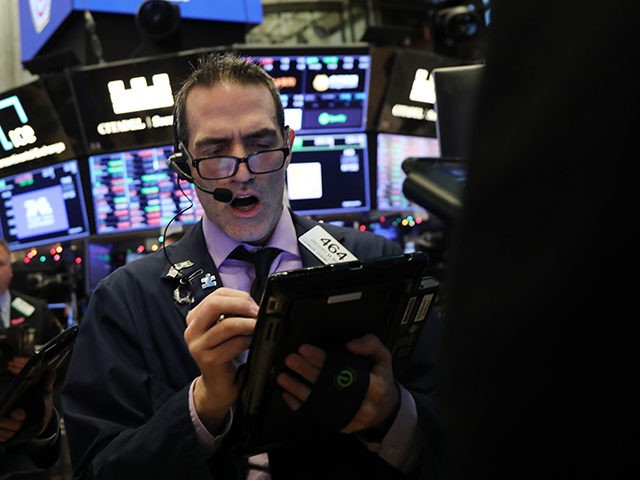The Dow Jones Industrial Average slid more than 650 points on Monday, marking the worst Christmas Eve trading day on record.
The S&P 500 index slid 65.52 points, or 2.7 percent, to 2,351.10. The Dow Jones Industrial Average sank 653.17 points, or 2.9 percent, to 21,792.20. The Nasdaq skidded 140.08 points, or 2.2 percent, to 6,192.92. The Russell 2000 index of smaller-company stocks gave up 25.16 points, or 2 percent, 1,266.92.
Monday’s sell-off extends the market’s losses after its worst week I more than seven years. The major indexes are down 16 to 26 percent from their autumn highs.
Trading was choppy and volume was light Monday during a shortened trading session ahead of the Christmas holiday Tuesday. U.S. markets are due to reopen for trading on Wednesday.
Technology stocks, health care companies, and banks took some of the heaviest losses in the sell-off, which began following news that the Mnuchin called CEOs of six major banks Sunday in an apparent attempt to stabilize jittery markets.
Mnuchin said the heads of Bank of America, Citigroup, Goldman Sachs, JP Morgan Chase, Morgan Stanley and Wells Fargo all assured him they have ample money to finance their normal operations, even though there haven’t been any serious liquidity concerns rattling the market. But the calls added to the underlying worries that have gripped markets of late.
By subscribing, you agree to our terms of use & privacy policy. You will receive email marketing messages from Breitbart News Network to the email you provide. You may unsubscribe at any time.
Bank stocks declined Monday. Wells Fargo slid 1.9 percent to $44.26.
The market briefly bounced back from the steep opening slide, then veered lower again around midmorning after Trump tweeted his latest volley of criticism at the Fed, which included: “The Fed is like a powerful golfer who can’t score because he has no touch – he can’t putt!”
Health care and technology stocks accounted for a big share of the selling Monday. Microsoft fell 2.2 percent to $96.05. Johnson & Johnson lost 4 percent to $122.99.
Oil prices, which have sunk on concerns about the state of the global economy and also oversupply in the market, continued to slide. Benchmark U.S. crude fell 3.1 percent to $44.18 a barrel in New York. Brent crude, used to price international oils, declined 2.6 percent to $52.43 a barrel in London.
The decline in oil prices weighed on energy stocks. Hess slumped 8.1 percent to $38.11.
Bond prices rose. The yield on the 10-year Treasury note fell to 2.77 percent from 2.79 percent late Friday.
The dollar fell to 110.50 yen from 111.31 yen on Friday. The euro strengthened to $1.1415 from $1.1370.
In Christmas holiday-thinned half-day trading in Europe, France’s CAC 40 fell 1.5 percent, while the FTSE 100 index of leading British shares slid 0.5 percent. Germany’s DAX was closed.
Major indexes in Asia finished mixed. South Korea’s Kospi dropped 0.3 percent, while Hong Kong’s Hang Seng lost 0.4 percent on a short trading day. Australia’s S&P ASX 200 added 0.5 percent. Markets in Japan and Indonesia, which is reeling from a weekend tsunami that has killed at least 373 people, were closed.
Despite slumping stock prices, U.S. consumer sentiment in December rose to 98.3 percent — a level only two other time periods have surpassed in nearly 60 years. “If the current expansion lasts past mid-2019, as is likely based on current data, it will become the longest expansion ever recorded,” according to a University of Michigan survey. Only the time periods — 1964-65 and 1997-2000 — were higher than in 2018, which registered a 98.4. Sentiment Index average.
Notably, a mere 12 percent of survey respondents said choppy market conditions were their chief economic worry. “While the plunge in stock prices has recently garnered the most attention in the national press, consumers have focused more on their concerns about income and job prospects,” the survey continued.
The Associated Press contributed to this report.

COMMENTS
Please let us know if you're having issues with commenting.